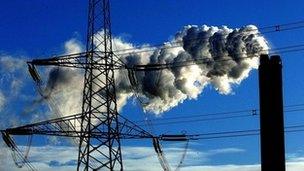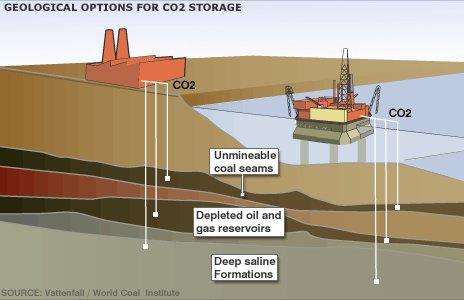New UK attempt to capture carbon
- Published

The aim of carbon capture is to is to prevent CO2 escaping into the atmosphere
A renewed attempt to develop ways of making power stations greener has been unveiled by the UK government.
For the second time in five years, £1bn will be offered for schemes to trap and bury carbon dioxide.
An earlier competition collapsed after all nine entrants pulled out, most citing cost as the main problem.
In October, the government pulled out of a project run by Scottish Power at Longannet in Fife, after failing to reach a deal with power companies.
Known as "carbon capture and storage" (CCS), the idea is to prevent CO2 escaping into the atmosphere.
A major part of the government's low-carbon strategy, CCS has been plagued by delays and uncertainty.
Launching the renewed competition and a roadmap towards commercialising CCS, Ed Davey, Energy and Climate Change Secretary, said the industry could be worth £6.5bn a year to the economy by the late 2020s.
"What we are looking to achieve, in partnership with industry, is a new world-leading CCS industry, rather than just simply projects in isolation," he said.
"The potential rewards from carbon capture and storage are immense: a technology that can de-carbonise coal and gas-fired power stations and large industrial emitters, allowing them to play a crucial part in the UK's low carbon future."
Its attraction is that existing fossil fuels including coal and gas can be burned without releasing the usual quantities of CO2, the key greenhouse gas.
Instead of being vented into the air, the gas would be trapped and then piped into long-term storage in old oil fields under the North Sea.
The concept divides environmentalists. Some argue that it makes sense to find cleaner ways of using fossil fuels, while others fear it gives coal and gas another lease of life, which would be counterproductive in the long-term campaign against climate change.
The original hope was for British firms to design systems that could be fitted to the soaring numbers of coal plants in China and India to reduce their emissions.
However, the research has proved costlier and more complicated than many expected, and the timescale keeps slipping.
Tom Greatrex, Labour's Shadow Energy Minister, said in a statement: "The UK has the potential to be a world leader in this vital low-carbon technology, and therefore the launch of the roadmap and competition are welcome.
"But there are still important questions that the government failed to answer today. The commercialisation programme contained no detail about the impact of Danny Alexander's raid on the £1bn CCS budget last year. Investors need to know exactly how much money will be available, and when."
Revised rules
Only last month, the National Audit Office criticised the government for taking "too long to get to grips" with the commercial and technical risks involved.
Now, ministers are hoping that by revising the rules for the competition they will have a better chance of attracting more interest.
In the last contest, entries were originally limited to designs that could only be used at power stations burning coal, not gas.
And the rules also only allowed systems that trapped carbon dioxide after the fuel was burned - so-called "post-combustion".
By contrast, the new competition will be open to coal and gas stations, and to schemes that attempt to capture carbon before combustion.

As one official put it to me: "Lessons have been learned and we're not closing our eyes to what industry is suggesting."
A three-month consultation opens with selected projects expected to be running by 2016-2020.
But, as with the last competition, a key factor will be viability. Although many of the technologies have been proven at a small scale, no industrial-scale project has yet been tested.
Prof Jim Watson of the UK Energy Research Centre welcomed the new competition but warned of the uncertainties that lie ahead.
"We still don't know when these technologies will be technically proven at full scale, and whether their costs will be competitive with other low-carbon options.
"These questions need answering urgently," he said.
A further concern is price. With the precise designs still to be settled, estimates for future running costs are uncertain, including the price of emitting carbon and the size of low-carbon subsidy.
The question of costs was raised by the union Prospect, which welcomed the decision but called for more clarity about financing.
The union's Head of Research, Sue Ferns, said that to ensure the success of CCS, it "must be integrated with electricity market reform.
"Market uncertainty remains a key barrier to investment across energy industries."
And she warned against seeking to reduce the costs too prematurely before the systems were proven.
"Government is understandably keen to reduce the costs of CCS deployment, but the first priority must be to make sure it works effectively on a commercial scale," she said.
The announcement comes amid uncertainty about the government's energy policy, after RWE and e.ON pulled out of a major project for new nuclear power stations last week.
The policy has four key strands: new nuclear stations, a huge expansion of renewables like wind, efficiency measures to cut energy use and reducing emissions from coal and gas by using carbon capture and storage.
So the new announcement marks another important effort to revive a potentially crucial technology that has faltered so far.
- Published19 October 2011
- Published6 October 2011